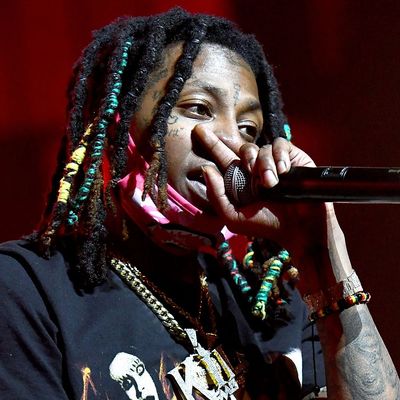
Every week, Vulture runs through the best, most interesting, and sometimes most confusing rap releases. This week, we’re focusing on some overlooked releases from this year because rap music is taking an early holiday vacation. Can’t we get a Christmas album or something?
Rucci, El Perro
The nature of memes is that they spread rapidly and almost untraceably, their dimensions flattened and their context collapsed. And so Blueface, a huge personality and one of the promising prospects in L.A.’s current street-rap explosion, has begun to lap his contemporaries in terms of notoriety outside of the Pacific time zone. Rucci, from over in Inglewood, is in many ways Blueface’s exact opposite. His music has been steadily improving for years; it was nearly this potent as far back as 2016’s MackkRucci, a collaboration with his close friend, the late Sean Mackk. And unlike the meat show, Rucci’s work — even its most raucous, unhinged component parts — runs in long-form, with its own internal history and psychological hang-ups.
His solo album from this year, El Perro, confirms Rucci as a major talent. Its title track opens with a package being shipped to his deported father:
“I just sent my daddy a Glock, he in Mexico
He always saying that I’m hot, I’m the next to blow
Still making drops at the Texaco
Still getting jocked by the federals”
Rucci has more in common with someone like Boosie than with Inglewood and broader L.A. predecessors from this decade and the last. El Perro is bracketed by jarring autobiography, and dotted with rabid barks of neighborhood pride — like the moment on “Like Woah” when he interpolates DMX: “Where the hood, where the hood, where the hood at / My name is Rucci and I’m bringing Inglewood back.” He also shares, with rappers like Meek Mill, a gift for building dynamics into what initially seems like a maxed-out vocal register.
Since El Perro, Rucci has dropped anthemic singles and delightfully virtuosic freestyles; there’s a collaborative record with more L.A. hopefuls and a new mixtape announced for this weekend. There is likely no skeleton key to instant national fame, but Rucci seems to be developing, right in front of us, into an artist of major consequence.
Serengeti, Dennis 6e
Serengeti might be the most purely original rapper working today, in terms of his performances and narrative work. Dennis 6e wraps up the story of Kenny Dennis, the washed-up, mustachioed ’90s rapper who lives in Chicago, reminiscing on his brief career and his fractured relationship with his late wife, and who is fictional, at least in the literal sense. Geti raps about community softball games in a way that makes the narrator seem like he’s having a psychic break; he turns smoke breaks outside of shitty jobs into dense, embarrassing, novelistic scenes. Andrew Broder’s production is moody, minimal, and perversely danceable.
Koran Streets, Late 20s
The most famous rapper from Berkeley is Lil B, whose work at the beginning of this decade did as much as anyone has ever done to rip rap out of the linear and into code for the broken RSS feeds our brains have become. Koran Streets, a fellow Berkeley native, is from the other end of the songwriting spectrum. His album from this year, Late 20s, spins disillusionment and professional anxiety into something that is urgent but murky. Many songs, in all genres, snap reflexively back to “This is a big obstacle but I will overcome it / have overcome it already”; Koran Streets writes the same emotions as things that are fluid and gnawing.
Nef the Pharaoh, The Big Chang Theory
There is a frustrating tendency among rap fans and rap critics to turn into industry prospectors — to guess, early on, about career trajectories in a way that makes the art itself secondary. The consequence of this is that, when artists who were once blue-chip prospects fail to become true stars, their work is all but cast aside. Nef the Pharaoh, a Vallejo native who has yet to turn 25, received far less press for his new album, The Big Chang Theory, than he had in years prior for his breakout singles. This is despite the fact that Chang is pointed, funny, and just mean enough to subvert the radiant smile he once put on his album cover. (See: the song where he complains that the fans who approach him in public act too familiar.) The greater Bay is up there with Baton Rouge as the best argument for rap as a uniquely regional form of expression, and Nef embodies his hometown, down to the lilts in his voice.
Drego & Beno, Sorry for the Get Off
There are, if you’re feeling particularly generous, one or maybe two rap songs this year better than Sada Baby and Drego’s “Bloxk Party,” which has no chorus but does have eight or ten of the most memorable lines of 2018. It appears on Sorry for the Get Off, a mixtape by Drego and Beno, both — like Sada Baby — Detroiters who are interesting in rapping as colorfully as possible without betraying weakness or self-doubt, except when it suits their cause. Most of the tape sounds as if it’s taking place inside the climax of a genre movie. It’s great.

